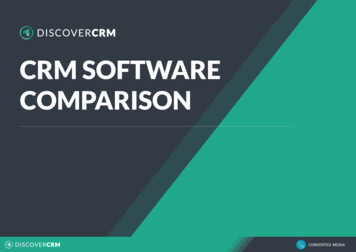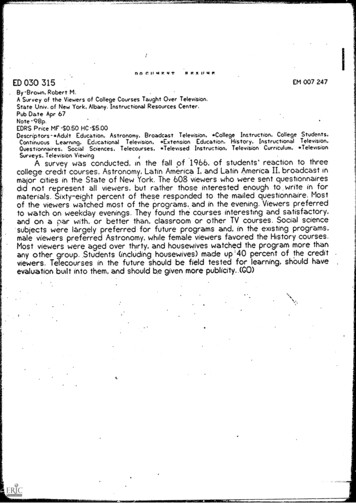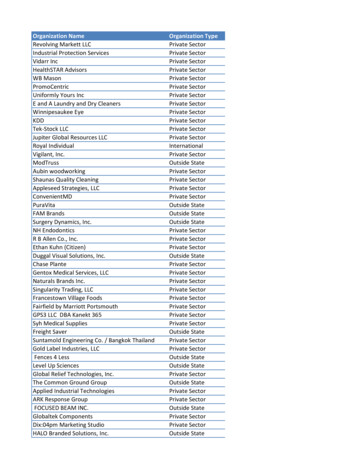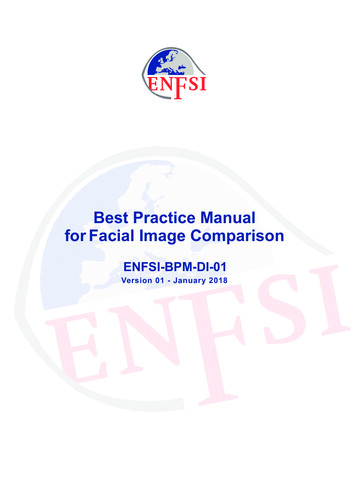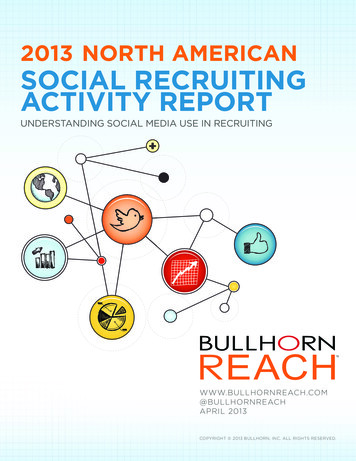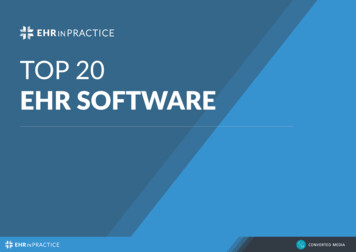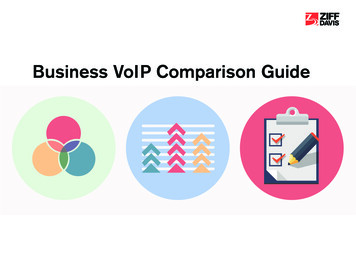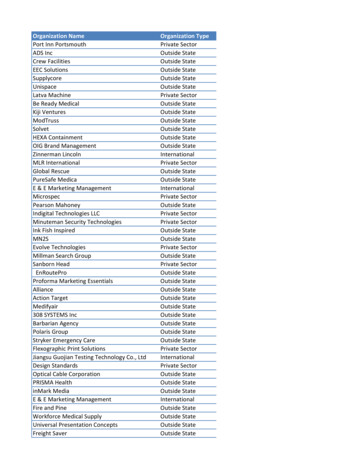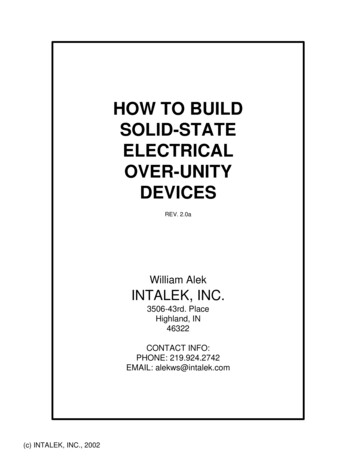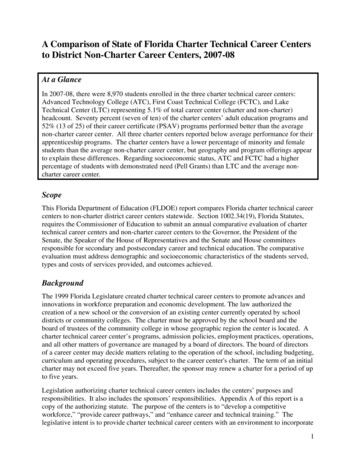
Transcription
A Comparison of State of Florida Charter Technical Career Centersto District Non-Charter Career Centers, 2007-08At a GlanceIn 2007-08, there were 8,970 students enrolled in the three charter technical career centers:Advanced Technology College (ATC), First Coast Technical College (FCTC), and LakeTechnical Center (LTC) representing 5.1% of total career center (charter and non-charter)headcount. Seventy percent (seven of ten) of the charter centers’ adult education programs and52% (13 of 25) of their career certificate (PSAV) programs performed better than the averagenon-charter career center. All three charter centers reported below average performance for theirapprenticeship programs. The charter centers have a lower percentage of minority and femalestudents than the average non-charter career center, but geography and program offerings appearto explain these differences. Regarding socioeconomic status, ATC and FCTC had a higherpercentage of students with demonstrated need (Pell Grants) than LTC and the average noncharter career center.ScopeThis Florida Department of Education (FLDOE) report compares Florida charter technical careercenters to non-charter district career centers statewide. Section 1002.34(19), Florida Statutes,requires the Commissioner of Education to submit an annual comparative evaluation of chartertechnical career centers and non-charter career centers to the Governor, the President of theSenate, the Speaker of the House of Representatives and the Senate and House committeesresponsible for secondary and postsecondary career and technical education. The comparativeevaluation must address demographic and socioeconomic characteristics of the students served,types and costs of services provided, and outcomes achieved.BackgroundThe 1999 Florida Legislature created charter technical career centers to promote advances andinnovations in workforce preparation and economic development. The law authorized thecreation of a new school or the conversion of an existing center currently operated by schooldistricts or community colleges. The charter must be approved by the school board and theboard of trustees of the community college in whose geographic region the center is located. Acharter technical career center’s programs, admission policies, employment practices, operations,and all other matters of governance are managed by a board of directors. The board of directorsof a career center may decide matters relating to the operation of the school, including budgeting,curriculum and operating procedures, subject to the career center's charter. The term of an initialcharter may not exceed five years. Thereafter, the sponsor may renew a charter for a period of upto five years.Legislation authorizing charter technical career centers includes the centers’ purposes andresponsibilities. It also includes the sponsors’ responsibilities. Appendix A of this report is acopy of the authorizing statute. The purpose of the centers is to “develop a competitiveworkforce,” “provide career pathways,” and “enhance career and technical training.” Thelegislative intent is to provide charter technical career centers with an environment to incorporate1
non-traditional teaching/learning methods, evaluate these methods, and identify which ones aresuccessful. Methods that are proven effective can then be incorporated into public technicalcareer centers’ curricula. The legislation creates this environment by exempting chartertechnical career centers from nearly all statutes of the Florida K-20 Education Code (see s.1002.34 (10), Florida Statutes). This gives charter technical career centers more local control,reduces response time to local business/industry needs, and decreases state-level involvement inareas such as decision-making, curriculum and assessment development, and instructor hiringpolicies. Section 1002.34 (19), Florida Statutes, requires evaluation of charter technical careercenters. It puts this requirement in very general terms such as “comparative evaluation of chartertechnical career centers and public technical centers,” “demographic and socioeconomiccharacteristics of students served,” and “outcomes achieved.”The mission of Florida’s charter technical career centers is to provide comprehensive andinnovative technical education programs, services and customized training to meet the needs ofcitizens, business and industry. Charter technical career centers’ purpose is to develop acompetitive workforce that supports local business and industry and economic development andcreates a training and education model reflective of marketplace realities. The career centersoffer an array of career educational opportunities using a school-to-work, tech prep, technical,academy, and/or magnet school models to provide career pathways for lifelong learning andcareer mobility, and to enhance career and technical training.The State of Florida currently has three charter technical career centers. These centers and theirsponsors are:1. Advanced Technology College (ATC) – Daytona State College2. First Coast Technical College (FCTC) – St. Johns County School Board3. Lake Technical Center (LTC) – Lake County School BoardFlorida’s Charter Technical Career CentersThree charter technical career centers have been established in Florida. On July 1, 1999, the St.Augustine Technical Center, which was operated by the St. Johns County School Board,converted to become the state’s first charter technical career center under the name of First CoastTechnical Institute. Two years later Flagler/Volusia Advanced Technology Center opened onAugust 20, 2001, at Daytona Beach Community College in Volusia County; it subsequently wasrenamed Advanced Technology College in 2007. Florida’s third technical career center, LakeTechnical Center, became a conversion charter technical career center in July 2004. First CoastTechnical College (FCTC), formerly First Coast Technical Institute, reauthorized its charter onJuly 1, 2004, and ATC reauthorized its charter on July 1, 2006. LTC’s charter is due forreauthorization in 2009.First Coast Technical CollegeSt. Johns County School Board sponsored FCTC as Florida's first postsecondary chartertechnical career center. FCTC is located in St. Augustine and serves the tri-county area of St.Johns, Clay, and Putnam counties. The St. Johns School District opened a new public highschool, St. Johns Technical High School on the campus of FCTC in 2004 which incorporated themodel of First Coast Technical High School and First Coast Skills Academy. FCTC’s mission isto “provide comprehensive, innovative technical and academic education and customized2
training to meet the needs of the community.”1 FCTC serves both adults and dually enrolledsecondary students through joint programs with St. Johns Technical High School.FCTC offers adult basic education programs, sixteen postsecondary career certificate programs,and an electrical apprenticeship program.2 All career and technical training programs aresupported by steering committees comprising members from business and industry. Career andtechnical training programs are competency based, with curriculum provided by the state andenhanced with input from business and industry to ensure that training meets industry standards.FCTC is accredited by the Council on Occupational Education and the Southern Association ofColleges and Schools. FCTC provides students with financial aid, guidance and careercounseling, career assessment, accommodations for students with special needs, and placementservices.FCTC holds certification and/or approval from the following organizations: American CulinaryFederation, American Medical Association, American Welding Society, Commission onAccreditation of Allied Health Education Programs, Committee on Accreditation of EducationalPrograms for the EMS Professions, Council on Occupational Education, Division of VocationalRehabilitation/Florida Department of Education, Florida Bureau of Fire Standards and Training,Florida Department of Children and Families, Florida Department of Health’s Bureau ofEmergency Medical Services, Florida State Board of Cosmetology, Florida State Board ofNursing, Florida Department of Education, National Automotive Technicians EducationFoundation, Inc., National Institute of Automotive Service Excellence, Southern Association ofColleges and Schools, Florida Department of Veterans Affairs, U. S. Department of Education,U.S. Department of Education Office of Student and Financial Aid, and U. S. Department ofVeterans Affairs.Advanced Technology CollegeAdvanced Technology College (ATC) is located in Daytona Beach. Its mission is to facilitate aneducational program leading to a high school diploma, a certificate, an associate degree or afour-year degree in a given occupational area for students in Flagler and Volusia counties. Theinstitution is designed to serve area high school juniors and seniors who dually enroll in aprogram of study that awards postsecondary credit applicable toward an associate in science(A.S.) degree, associate in applied science (A.A.S.) degree, college credit certificate, or careercertificate that is also applicable toward high school graduation. The curriculum integrates theacademic and technical components of the programs of study to maximize the relevance of eachstudent’s educational experience.Occupational specializations are in the Engineering & Manufacturing and Business & MarketingClusters, as defined by the Volusia/Flagler Career Connection Consortium. Through ATC’sacademic dual enrollment options, high school students achieve competencies in mathematics,science and communication through an integrated, sequential, rigorous and relevant course ofstudy. Students may choose the path of employment, entrepreneurial venture and/orpostsecondary education program gaining the skills and knowledge to pursue lifelong learning.ATC is designed to provide students the education and skills necessary to work in one of manytechnology careers and build a better workforce for area employers. Students receive high12FCTC charter, page 2.For descriptions of the programs discussed in this report, refer to Appendix B.3
school diplomas from their home district high schools and/or receive certificates or degrees fromDaytona State College. Students must meet the graduation and/or program requirementsapproved by the State of Florida and the individual governing boards.According to the ATC Web site, the institution offers 32 career and technical programs: 17college credit certificates, eight A.S. programs, four A.A.S. programs, and three career certificateprograms. All programs provide extensive workplace experiences through a system ofcooperative education and pre-apprenticeship programs. Instructional delivery at ATC integratesacademic and occupational competency-based curriculum to produce graduates that meet orexceed business and industry workforce standards. Each occupational program includes thenecessary certifications for employment and core academics that are identified as essential byeducation and business experts.All of ATC’s programs are accredited under Daytona State College’s Southern Association ofColleges and Schools level-two accreditation, which was most recently reaffirmed in 2003. Inaddition, the automotive service technology and collision repair programs are NationalAutomotive Technology Education Foundation (NATEF) accredited.The computer science program curriculum is designed to prepare students for the followingindustry certifications through the college’s onsite Comp/TIA certification center: MicrosoftCertified Technology Specialist (MCTS), Microsoft Certified IT Professional (MCITP),Microsoft Certified Professional Developer (MCPD), Microsoft Certified Architect, MicrosoftCertified Desktop Support Technician (MCDST), Microsoft Certified Learning Consultant(MCLC), Microsoft Certified Systems Administrator (MCSA), Microsoft Certified SystemsEngineers (MCSE), Microsoft Certified Database Administrators (MCDBA), Microsoft CertifiedApplication Developers (MCAD), Microsoft Certified Solution Developers (MCSD), andMicrosoft Office Specialist (MOS).Lake Technical CenterLake Technical Center’s main campus is located in Eustis, Florida, and is a career-technicalpostsecondary institution that provides job preparatory and supplemental training. The Instituteof Public Safety, located in Tavares, Florida, operates as an LTC extension campus and offersbasic and continuing education programs in law enforcement, corrections, and firefighting.LTC serves Lake County as well as students from other areas of the state. Non-resident students,including international students, are also served. LTC offers 28 career certificate programs inaddition to two apprenticeships, continuing workforce education classes, and adult educationprograms. Secondary students may dual enroll in LTC’s career certificate programssimultaneously earning both secondary and postsecondary credit.LTC is accredited by the Council on Occupational Education and by the Commission onInternational and Trans-Regional Accreditation. Individual programs are certified by thefollowing accrediting bodies: Commission on Accreditation of Allied Health EducationPrograms, Florida State Board of Nursing, Florida State Board of Massage Therapy, FloridaDepartment of Health’s Bureau of Emergency Medical Services, Florida Criminal JusticeStandards and Training Commission, American Culinary Federation and Florida State Board ofCosmetology.4
Financial DataThis section will compare costs and revenues reported by the three charter technical careercenters. Below in Table 1 are data from independent audit reports performed on each of thethree charter technical career centers for the fiscal year ending June 30, 2008. The first sectioncomprises four major cost categories followed by a section that differentiates federal, state, andlocal revenue sources. The bottom row (“Net Change”) is the difference between costs andrevenue for the year and is applied toward each institution’s reserve fund. FCTC allocated asmaller percentage of its resources to instruction and a higher percentage to services than its peercharter technical centers. On the revenue side, ATC reported very little local revenue. Incontrast, LTC and FCTC relied more heavily on local revenues.Table 1Charter technical career center financial data for fiscal year ending on June 30, 2008Expenditure CategoriesFCTC PercentInstruction 4,850,42840.7%Administration 687,4295.8%Services 4,150,82334.8%Plant and Operations 1,587,16813.3%Fixed Capital Outlay 649,9475.4%Total 11,925,795 100.0%ATC Percent 3,447,48166.0% 314,8506.0% 744,60314.2% 719,19813.8% 00.0% 5,226,132 100.0%LTC Percent 6,407,06875.5% 847,88810.0% 435,3145.1% 792,0879.3% 00.0% 8,482,357 100.0%RevenueFederalStateLocal and OtherATC Percent 338,6206.9% 4,562,43993.0% 6,7350.1% 4,907,794 100.0%LTC Percent 805,2928.7% 5,394,86658.0% 3,102,77033.4% 9,302,928 100.0%FCTC Percent 990,2828.0% 7,827,23263.6% 3,488,20228.3%Total 12,305,716 100.0%Net Change 379,921Source: Independent audit reports( 318,338) 820,5715
Comparative Analysis of Workforce Education Productivity3EnrollmentCharter technical career center enrollment represented 5.1% of the total charter and non-chartertechnical career center enrollment. Table 2 shows statewide public career center and chartertechnical career center 2007-08 student headcount in adult and non-college-credit careereducation programs. Enrollment is disaggregated by instruction type, with the largestenrollment in each row highlighted. The largest program area enrollment for LTC wascontinuing workforce education (41%). FCTC’s largest program area was career certificateprograms (46%) while ATC’s highest enrollments were in college credit programs (53%). Thesedistributions are as expected given the types of programs offered by each charter technicalcareer center. For instance, ATC is the only institution authorized to offer associate degreeprograms (through Daytona State College).LTC had the most uneven program enrollment distribution with almost half of its enrollment inone area, continuing workforce education for licensure renewals and upgrades. The publiccareer centers’ largest student enrollments were in Adult General Education: secondary-levelcourses at or below the twelfth grade level. The charter technical career centers’ largestaggregate student enrollments (33%) were in career certificate programs.3All enrollment and performance data are extracted from Florida Department of Education (FLDOE) databases.FCTC and LTC submit data through the FLDOE Workforce Development Information System (WDIS).Community College and Technical Center Management Information System (CCTCMIS) personnel then identifystudents enrolled in district-sponsored charter technical career centers. CCTCMIS identifies all other districttechnical career center students as public technical career center students. Daytona State College (DSC), whose dataare reported on the Community College Student Data Base (SDB), sponsors ATC. DSC personnel extract andsubmit a file of ATC student identifiers directly to FLDOE. CCTCMIS staff then match this file into the SDB toretrieve enrollment and performance data. The current report compares each of the three charter technical careercenters to the aggregated forty-two (42) Florida public technical career centers.6
Table 2Career center headcount by postsecondary and adult program categoryLakeTechnicalCenterFirst CoastTechnicalCollegeAdvancedTechnologyCollegeAll 33%24%5%0%12%SchoolPublic NonCharterCareerCentersCareerContinuing Apprenticeship AppliedCertificate D's)TotalEnrollmentATC reported a total headcount of 1,034 students in college credit programs, 260, or 25%, ofwhich were dually enrolled high school students. Among its college students, 83.8% were inA.S. or A.A.S. programs, 7.5% were in college credit certificate (CCC) programs, and 0.3%were in Applied Technology Diploma (ATD) programs. Despite its classification as a technicalcenter, 8.4% of ATC’s college students were in Associate of Arts (AA) programs. The averagecumulative grade point average among ATC’s college students was 2.95 in academic year 200708.PerformanceThis section will evaluate the student performance among the charter technical career centers in2007-08 in three separate program areas: adult general education, career certificate (PSAV), andapprenticeship programs. Students’ technical and literacy skills acquisition or advancement ismeasured by “completion points:” occupational completion points (OCPs) for technical skillsand literacy completion points (LCPs) for adult general education skills. Each point represents adiscrete level of skill within a program. The first performance measure reported in this section isthe percentage of students who earned at least one completion point during the 2007-08academic year. While this measure indicates the breadth of learning gains among enrolledstudents, the second measure, the ratio of completion points to students enrolled, is a generalmeasure of the number of skills acquired per student, or depth of learning, during the year.Because adult general education and career certificate categories are rather broad and include a7
variety of program types with different amounts of time required to earn completions,performance calculations are compared by program.4 For comparative purposes, we havecalculated statewide averages for each program among all 42 non-charter technical centers forboth measures. Small programs at the charter technical career centers (20 students or less) wereexcluded from the analysis. Note that because the following are comparisons of aggregatedgroups of students, student-level characteristics such as baseline academic performance anddemographics are not controlled for in the analysis. Also, these are norm-referencedcomparisons because there is no statewide, standardized, criterion-referenced performancemeasurement available.Each table below includes annual program headcount (“headcount”), the percentage of thosestudents who earned at least one completion point (“% at least one LCP or OCP”), the ratio ofcompletions to headcount (“completion-to-headcount”), and, for comparative purposes, thestatewide average among all non-charter career centers for both of those measures. Chartertechnical center indicators that fall below the statewide non-charter technical career centeraverage are shaded.Adult Education PerformanceTables 3, 4, and 5 reveal that students enrolled in seven out of the ten charter technical careercenter adult education programs analyzed in this report (70%) performed better than thestatewide average of all non-charter career centers on one or both performance indicators.LTC’s vocational preparatory instruction program and FCTC’s general education promotion(adult high school) and adult English as a Second Language (ESOL) programs performedslightly under the state average.Table 3Lake Technical Center adult education performanceProgramGeneral EducationalDevelopment (GED)Adult Basic EducationAdult English as aSecond Language("ESOL")VocationalPreparatoryInstruction% at leastHeadcount one LCPStateAverageCompletiontoHeadcount 24For example, students at lower literacy levels will earn LCPs at a much slower rate than students at an adult highschool who earn an LCP with every course. Students in automotive service technology programs can earn manymore OCPs in a year than web design students.8
Table 4First Coast Technical College adult education performanceProgramGeneral EducationalDevelopment (GED)VocationalPreparatoryInstruction% at leastHeadcount one LCPStateAverageCompletiontoHeadcount 9128.6%30.4%0.360.49Adult Basic EducationGeneral EducationPromotionAdult English as aSecond Language("ESOL")Table 5Advanced Technology College adult education performanceProgramGeneral EducationPromotion% at leastHeadcount one LCP29494.6%StateAverage61.5%CompletiontoHeadcount StateRatioAverage4.511.429
Career Certificate PerformanceTables 6, 7, and 8 below show that 13 out of 25 charter technical career center certificateprograms (52%) performed better than the statewide average of all non-charter career centers onone or both performance indicators. In most cases there is no programmatic pattern among theunderperforming programs, but four out of the five underperforming programs at LTC are in thehealth science career cluster. In some cases, no occupational completion points (OCPs) werereported for the year. FCTC reported zero OCPs earned for its 70 Fire Inspector I students andATC reported zero OCPs earned for its Computer Systems Technology and Automotive ServiceTechnology students. All of ATC’s career certificate programs performed well under the stateaverage. This may be a function of dual enrollment in that high school students may not haveenough time to earn OCPs, but there was insufficient data to verify this.Table 6Lake Technical Center career certificate program performanceProgram% at leastHeadcount one OCPStateAverageCompletion State/ Headcount 77.0%67.5%1.521.08Law EnforcementOfficer9563.2%59.6%0.630.60Commercial Foodsand Culinary .961.31385.3%46.6%0.050.77CosmetologyApplied WeldingTechnologiesFire Fighter IICorrectional OfficerNursing Assistant(Articulated)Practical NursingEmergency MedicalTechnician (Basic)Paramedic10
Table 7First Coast Technical College career certificate program performance% at leastHeadcount one OCPStateAverageCompletion/ StateHeadcount 9691.8%67.5%1.271.08Emergency MedicalTechnician (Basic)20779.7%84.4%1.571.08Patient CareTechnician11091.8%73.6%2.422.16Applied %0.940.776875.0%87.9%1.471.45Commercial Foodsand Culinary Arts19447.4%71.2%1.341.94Nursing .1%0.000.24CosmetologyPractical NursingFire Fighter IIParamedicPhlebotomyFire Inspector ITable 8Advanced Technology College career certificate program performance% at leastHeadcount one OCPProgramAir Conditioning,Refrigeration and8624.4%Heating Technology(PS)Automotive Collision519.8%Repair andRefinishingStateAverageCompletiontoHeadcount r SystemsTechnology320.0%63.7%0.001.15Automotive ServiceTechnology210.0%58.0%0.002.0711
Apprenticeship PerformanceTable 9 below shows non-charter and charter technical career centers’ apprenticeship studentperformance indicators. Apprenticeship students who complete a full year of instruction earnone OCP. Students leaving before one full year decrease this ratio (or students entering late inthe year). All three charter technical career centers performed under the statewide average of allnon-charter career centers, and FCTC reported zero completions for its 110 apprentices.Table 9Charter technical career center apprenticeship performancePublic NonCharterCareerCentersFirst TechnicalCenterUnduplicatedHeadcount% at least 00.0%0.0025621.4%0.219739.6%0.6312
Gender DistributionThe statewide public technical center female/male ratio was fairly well balanced: 49.7% femaleand 50.3% male (see Table 10 below). FCTC had a slightly higher percentage of female students(52.4%) than male students (47.6%). ATC had a much higher proportion of male students(86.7%) than female students (13.3%). ATC’s predominately male student population is due tothe school’s limited program offering. ATC offers four career certificate programs, all of whichthe Department of Education recognizes as non-traditional for females: Computer SystemsTechnology; Air Conditioning, Refrigeration, and Heating Technology; Automotive CollisionRepair and Refinishing; and Automotive Service Technology. Lake Technical Center’smale/female proportions were slightly more skewed toward male students than the statewideaverage.Table 10Career center gender distributionFemaleMale49.7%50.3%First CoastTechnical 7%Lake TechnicalCenter44.9%55.1%Public NonCharter CareerCentersRace/Ethnicity DistributionTable 11 shows that statewide, White (non-Hispanic) students constituted a much largerproportion of the charter technical career centers’ student populations (72%) than that of the noncharter career centers (39%). There were corresponding larger percentages of African-American(non-Hispanic) and Hispanic students among non-charter career centers.Table 11Race/ethnicity distribution among career 4%72%13
Race/ethnicity distribution at the public career technical centers and charter technical careercenters are more likely reflective of the centers’ locations than the centers’ recruiting efforts.Specifically, the large Hispanic population in South Florida influences the statewide numbers.The charter technical career centers’ mid-Florida locations result in a smaller percentage ofHispanic students and an increase in other ethnic groups’ percentages. The remainder of thissection will compare the charter technical career centers’ race/ethnicity distributions to thecorresponding K-12 distributions in each center’s service area to make valid comparisons.Table 12 (below) reveals that FCTC’s race/ethnicity distribution was very similar to that of thedistricts that the institution serves. The White students represented 72% of FCTC’s enrollmentand 75% of the K-12 students at the districts which FCTC serves. The largest percentagedifference was in African-American students, which was six percentage points higher at FCTC(19%) than at the K-12 districts (13%) that FCTC serves. The Hispanic proportion was 6% forFCTC’s students and 7% for K-12 students in FCTC’s service area.Table 12Race/ethnicity distribution at First Coast Technical CollegeFirst CoastTechnical CollegeClay, Putnam, &St. John’s 3%72%13%7%5%75%Table 13 (below) shows the percentage of ATC students who were White (74%) is tenpercentage points higher than among Flagler and Volusia K-12 public schools (64%).Table 13Race/ethnicity distribution at Advanced Technology CollegeAdvancedTechnology CollegeFlagler & VolusiaCounty %6%74%15%15%6%64%14
Table 14 (below) reveals that LTC’s race/ethnicity distribution is relatively close to that of LakeCounty schools. LTC’s Hispanic enrollment (12%) lagged five points behind that of LakeCounty’s K-12 population (17%).Table 14Race/ethnicity distribution at Lake Technical CenterAfricanAmericanHispanicOtherWhiteLake TechnicalCenter14%12%3%71%Lake County K-12Students16%17%5%62%Financial NeedPell grants are a federal need-based grant program available to students enrolled in careercertificate programs of 600 hours or more. The percentage of postsecondary students receivingPell grants reflects both the students’ socioeconomic status and the schools’ program lengths: ahigher proportion of students enrolled in programs over 600 hours results in a higher proportionof students who are eligible for Pell grants based on program length alone. LT
Microsoft Certified Professional Developer (MCPD), Microsoft Certified Architect, Microsoft Certified Desktop Support Technician (MCDST), Microsoft Certified Learning Consultant (MCLC), Microsoft Certified Systems Administrator (MCSA), Microsoft Certified Systems Engineers (MCSE), Microsoft Certified Database Administrators (MCDBA), Microsoft .
